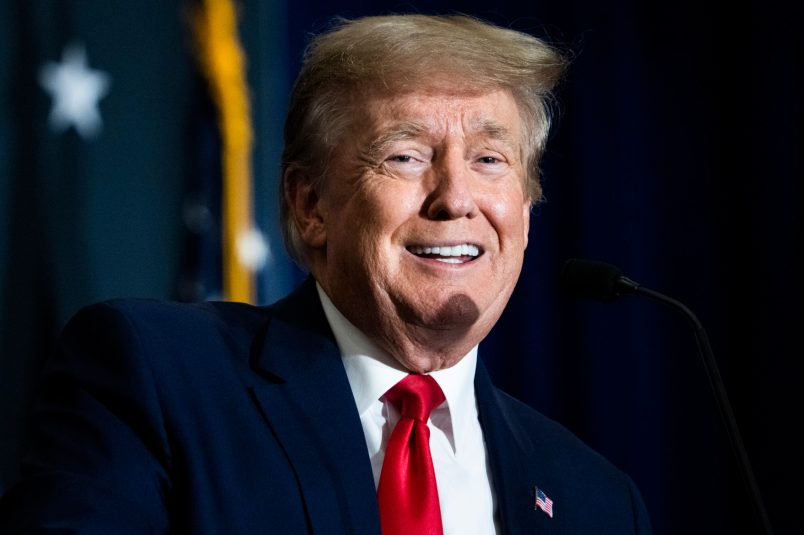Federal prosecutors will appeal at least part of a Monday order from a Florida federal judge relating to records they obtained from searches at Mar-a-Lago last month.
In a Thursday court filing, prosecutors said that they would appeal the matter to the Eleventh Circuit. The DOJ also asked U.S. District Judge Aileen Cannon for the Southern District of Florida in a separate filing to temporarily halt her order stopping investigators from using records it seized in the search for its investigation, as far as it applied to classified documents that the government took.
The government also wants Cannon to stay part of her order relating to the special master’s review, blocking the special master from being able to look at classified records that were seized.
It’s not clear what portion of the order the DOJ is appealing. Judge Cannon’s ruling enjoined prosecutors from using any of the records seized for investigative purposes and also appointed a special master to sort through the records.
The records that FBI agents took came as part of a search for government documents — some of them classified — that Trump took with him after leaving office.
In the filings, prosecutors suggested that the U.S. government was having trouble understanding Cannon’s Monday order, which many in the legal community derided as “corrupt” and contrary to the principles of equal justice before the law.
Prosecutors said that the order had effectively “prevent[ed]” the intelligence community from undertaking a damage and risk assessment about the consequences of Trump taking the classified information.
But the order, prosecutors argued, did not bar the government from taking other, non-investigative actions with the records. That, they wrote, includes “briefing Congressional leaders with intelligence oversight responsibilities regarding the classified records that were recovered.”
“The government similarly does not understand the Order to restrict senior DOJ and FBI officials, who have supervisory responsibilities regarding the criminal investigation, from reviewing those records in preparation for such a briefing,” the filing reads.
Prosecutors have noted in a detailed inventory released earlier this week that many of the folders marked with various levels of classification were empty upon their seizure at Mar-a-Lago. The government argued that it would likely prevail on its appeal in part to continue its investigation into where the materials held within ended up.
“The FBI would be chiefly responsible for investigating what materials may have once been stored in these folders and whether they may have been lost or compromised—steps that, again, may require the use of grand jury subpoenas, search warrants, and other criminal investigative tools and could lead to evidence that would also be highly relevant to advancing the criminal investigation,” prosecutors wrote.
Through most of the filing, prosecutors ignore the element of Cannon’s rule that struck many as the most offensive: the notion that Trump, by virtue of his status as a former President, deserved more deference because he had more to lose.
But in the final paragraph, prosecutors made an oblique reference to Cannon’s finding that Trump is special. The government said that Trump had only one possible injury, and that it “relates to the government’s investigation itself.”
Prosecutors added that defending against “potential criminal prosecution” cannot be a harm in the sense that Cannon found it was.
“That is why courts have exercised great caution before interfering through civil actions with criminal investigations or pending cases,” prosecutors wrote.
Prosecutors also dismiss Cannon’s finding that the special master would have something to adjudicate with respect to executive privilege.
Trump has long used the concept as an all-purpose shield, arguing before congressional committees — and now federal prosecutors — that as a former president, he still owns government documents.
It’s a stance that’s almost completely divorced from federal law, which mandates that records from an administration stay in government custody with the National Archives. Cannon broke with nearly every other court decision in the area by finding that Trump had a potential claim to assert executive privilege over the records, thereby blocking them from the DOJ.
Prosecutors noted in their filing that not even the Supreme Court was willing to entertain Trump’s privilege arguments in a 2022 case shooting down an attempt to use it to block the Jan. 6 Committee from accessing his records went that far.
It would not make sense, prosecutors said, “that a former President can successfully assert executive privilege to prevent the Executive Branch itself from reviewing and using its own records.”
Senior DOJ officials signed onto the memo, including Assistant Attorney General Matthew Olsen, who leads the National Security Division. Alan Kohler, Jr., the assistant director of the FBI’s Counterintelligence Division, also filed an affidavit supporting the motion.
Prosecutors told Cannon that if she did not grant a stay in one week — by Sept. 15 — they would immediately “seek relief” from the Eleventh Circuit Court of Appeals.
“A stay would simply allow the government to continue to review and use the same records—which, again, indisputably belong to the government, not Plaintiff—in its ongoing criminal investigation as well,” the filing reads.







…at least part…
Although it will entail delay and some risk of an adverse ruling, I think this is the right decision. The DOJ can’t stand by and, worse yet, play along with an order that so blatantly affords rights and protections to one privileged man that no other person in the United States can expect to receive. The order was a travesty and failing to call it out and appeal it would be a travesty as well–if “Equal Justice Under Law” means anything.
Among other things, this solidifies identifying who actually values National Security.
If Fat Boy gets overturned on appeal, we can guarantee that he heads straight for Mussalito and Uncle Thomas…